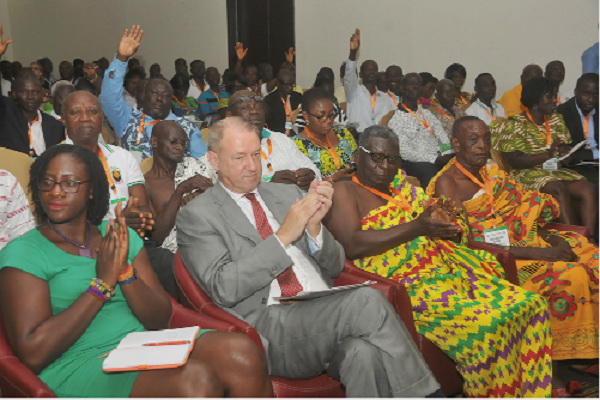
Maiden cocoa conference opens in Accra
The first edition of the global cocoa conference, which seeks to bring cocoa farmers and other stakeholders in the value chain to deliberate on the critical issues in the cocoa sector, opened in Accra yesterday.
The two-day conference is expected to come up with a declaration that would introduce a road map to help find lasting solutions to challenges confronting farmers.
Advertisement
Collaboration among stakeholders
In an opening statement, the President of the World Cocoa Farmers Organisation, Mr Abraham Adusei, stated that there was the need to build bridges that would pave the way in realising an inclusive cocoa sector where each stakeholder played a deserved role.
“It is only through working together between all relevant stakeholders which include farmers, the government, industry and non-governmental organisations (NGOs) that we will be able to reach an inclusive, prosperous, traceable and sustainable cocoa sector that benefits people, business and the environment,” he stated.
Role of farmers
Mr Adusei observed that as farmers, they were the ones who supplied the raw material that drove the value chain yet until now, “we are being deprived of playing our role as equal partners in the sector.
“We, the cocoa farmers around the globe, are unable to manage our daily responsibilities, particularly in West Africa,” he said.
Interventions
The Managing Director of the Quality Control Limited of the Ghana Cocoa Board (COCOBOD), Mr Isaac Yaw Opoku, said the board had introduced various interventions to improve cocoa production in the country.
He named some of the interventions as early mass spraying, pruning of cocoa farms, subsidised fertilisers, and the cutting down of trees infected by the swollen shoot disease.
Dr Opoku expressed concern that most cocoa trees had been in existence for over 30 years, contributing to low yields.
He said COCOBOD had decided to rehabilitate such farms by cutting down the aged trees and replacing them with new seedlings.
Low yields
Dr Opoku noted that farmers in Ghana recorded as low as between 350 kilogrammes and 450 kilogrammes of beans per hectare, compared to other countries where yields per hectare were between 1.5 tonnes and 3.0 tonnes per hectare.
He said in order to improve the lives of the farmers, the government was liaising with the research institutions to develop hybrid cocoa seeds which would be drought resistant and have early maturity periods.
Threats
The 2012 National Best Cocoa Farmer, Nana Agyenim Boateng Agyapong, noted that the biggest threat to cocoa sustainability was the lack of recognition for the poor cocoa farmer who toiled all day long, yet remained poor.
“We in Ghana acknowledge the fact that there are too many cocoa farmers still living in poverty.
“It is, therefore, our hope that we get the recognition at all stakeholder platforms to contribute our quota to policy discussions that will help improve the livelihood of all cocoa farmers and also make cocoa farming attractive to the youth for them to take the place of the aged,” he said.
Netherlands, the gateway
The Netherlands Ambassador to Ghana, Mr Ron Strikker, noted that the Netherlands was the gateway to Europe for cocoa export, adding that his country imported about 20 per cent of Ghana’s cocoa, making it the largest buyer.
He observed that one of the challenges facing the cocoa sector was how to lift cocoa farmers out of poverty, stating that farmers had limited bargaining power and, thus, could not raise prices.



